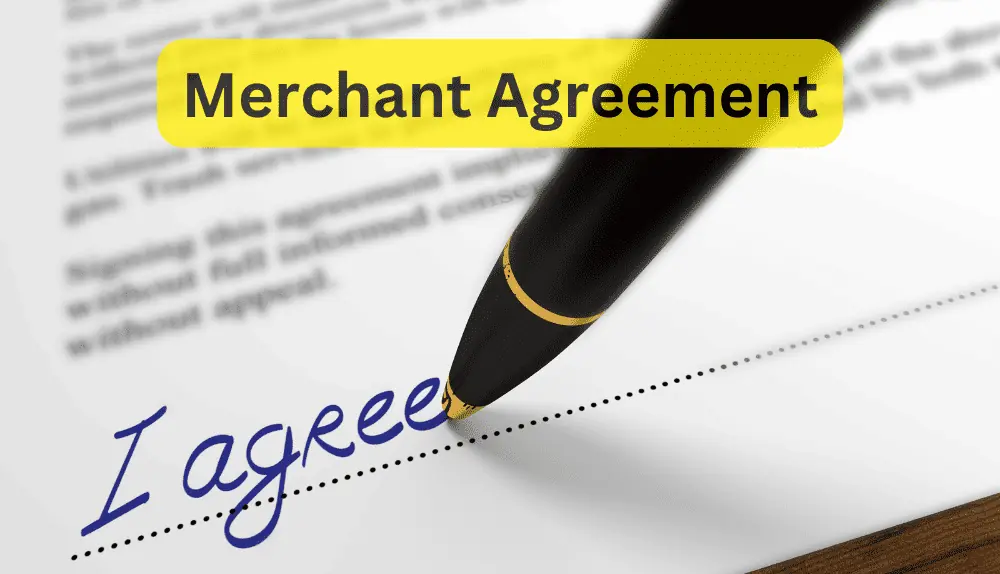In the ever-evolving world of commerce, embracing digital payment methods has become a paramount necessity for businesses of all sizes. As the global market continues its steady shift towards a cashless society, customers now prefer the convenience and security of card payments over traditional forms of exchange. If you find yourself on the threshold of accepting card payments for your business, then you’ve likely come across the term “Merchant Agreement.”
But what exactly is a Merchant Agreement, and how does it play a vital role in facilitating seamless transactions? In this article, we’ll unravel the mystery behind this essential document and shed light on its significance in ensuring your business stays ahead in the competitive market of today. So, let’s delve into the world of merchant agreements and discover how they serve as the fundamental backbone of your journey into the realm of digital payments.
What is a Merchant Agreement?
A Merchant Agreement, also known as a Merchant Services Agreement, is a legally binding contract between a business and a merchant services provider. Its primary purpose is to establish the terms and conditions for accepting electronic payments, particularly credit and debit card transactions. This agreement acts as the cornerstone of the relationship between a merchant and the payment processing company, outlining their rights, responsibilities, and obligations.

The document typically covers various aspects, including the types of payment methods accepted, processing fees, transaction limits, chargeback procedures, and data security measures. It also defines the settlement period during which funds from customer transactions are deposited into the merchant’s account.
Merchant agreements are vital for businesses, especially those venturing into the online realm or transitioning to card payments from traditional cash-based systems. By entering into this agreement, merchants gain access to essential payment processing services, such as authorization of transactions, capturing funds, and reconciling payment data. Moreover, the agreement helps protect both parties’ interests by setting clear guidelines for dispute resolution and ensuring compliance with industry regulations and card network rules.
Before signing a merchant agreement, it is crucial for business owners to thoroughly review its terms and conditions, including any hidden fees or penalties, to make informed decisions about the most suitable payment processing solution for their specific needs.
How Does Merchant Agreement Work?
The Merchant Agreement establishes a contractual relationship between a business (the merchant) and a merchant services provider (often a financial institution or payment processor). This relationship is essential for the merchant to accept electronic payments, enabling customers to use credit or debit cards for transactions. The agreement sets the terms and conditions for this partnership, outlining the roles and responsibilities of each party involved.
Scope of Payment Services
The agreement outlines the scope of payment services provided by the merchant services provider. It specifies the types of payment methods the merchant can accept, which may include credit cards (Visa, Mastercard, etc.), debit cards, mobile payments, and online payment gateways. Additionally, the agreement may cover other services such as recurring billing, electronic check processing, and point-of-sale (POS) systems.
Fee Structure and Costs
One crucial aspect of the Merchant Agreement is the fee structure and associated costs. It details the various fees charged by the payment processor, including transaction fees, interchange fees, monthly service fees, chargeback fees, and any other applicable charges. Merchants must have a clear understanding of these costs to assess the financial implications of accepting electronic payments.
Data Security and Compliance
Security is paramount in electronic payment processing, and the agreement addresses data security and compliance requirements. It outlines the merchant’s obligations in safeguarding customer payment information and complying with industry standards such as PCI DSS (Payment Card Industry Data Security Standard). Adhering to these security measures is essential to protect both the merchant and their customers from potential data breaches and fraud.
Settlement and Funds Disbursement
The agreement establishes the settlement period, which is the time it takes for funds from customer transactions to be deposited into the merchant’s bank account. It also defines the process for reconciling payments and managing chargebacks or refunds, ensuring a smooth flow of funds for the merchant.
Term and Termination
The Merchant Agreement typically has a specific term outlining the duration of the contractual relationship between the merchant and the payment processor. It may be a fixed term or an evergreen agreement with automatic renewals. The document also specifies the conditions under which either party can terminate the agreement, along with any associated penalties or notice periods.
Dispute Resolution and Legal Considerations
In case of disputes or disagreements, the agreement sets forth the procedures for resolving conflicts between the merchant and the payment processor. It may include provisions for mediation or arbitration before resorting to legal action.
Overall, the Merchant Agreement serves as a critical framework that governs the partnership between the merchant and the payment processor, ensuring transparency, security, and adherence to regulations throughout the payment processing journey.
How Terms are Set in a Merchant Processing Agreement?
Setting the terms in a Merchant Processing Agreement involves a negotiation process between the merchant (business owner) and the merchant services provider (payment processor or financial institution). The terms are typically agreed upon before signing the contract, and they outline the specific conditions under which the merchant will accept electronic payments and utilize the services provided by the processor. Here’s an overview of how the terms are established in a Merchant Processing Agreement:
Initial Proposal
The process begins with the payment processor presenting an initial proposal to the merchant. This proposal outlines the general terms, including the types of payment methods accepted, the fee structure, the settlement period, data security requirements, and other essential aspects of the agreement.
Customization and Negotiation
Merchants often have unique needs and requirements based on the nature of their business. During the negotiation phase, both parties discuss and customize the terms to align with the merchant’s specific needs and preferences. This may involve adjusting transaction fees, specifying the types of cards accepted, and setting suitable processing limits.
Fee Structure
One of the critical elements in a Merchant Processing Agreement is the fee structure. The parties agree on the different fees associated with payment processing, such as transaction fees, interchange fees, monthly service fees, chargeback fees, and others. Merchants may try to negotiate lower fees or seek transparent pricing to avoid hidden costs.
Data Security and Compliance
The agreement includes provisions related to data security and compliance with industry standards, such as PCI DSS. The merchant services provider may specify the security measures the merchant must implement to protect sensitive customer data and ensure compliance with data protection regulations.
Length of Agreement and Renewals
The parties decide on the term of the agreement, which may be for a fixed duration or an evergreen contract with automatic renewals. They also establish the notice period required for termination, giving both parties enough time to make necessary adjustments.
Services and Support
The agreement clarifies the services provided by the payment processor, such as authorization of transactions, settlement of funds, and customer support. It also outlines the level of customer service and technical support the merchant can expect.
Termination and Penalties
The terms may include conditions under which either party can terminate the agreement. It may specify any penalties or fees applicable in case of early termination.
Dispute Resolution and Legal Considerations
To avoid potential conflicts, the agreement includes procedures for resolving disputes between the parties. This may involve mediation or arbitration before resorting to legal action.
Once both parties have reached a consensus on the terms, they formalize the agreement by signing the document, making it legally binding. It is essential for merchants to thoroughly review the terms and seek legal advice if needed, ensuring they fully understand their obligations and the services provided by the merchant services provider.
Things to Look for in a Merchant Agreement
When entering into a Merchant Agreement, it’s essential for merchants to carefully review and understand the terms and conditions outlined in the contract. Here are some critical aspects to look for in a Merchant Agreement:

Fees
Thoroughly examine the fee structure to understand all costs associated with payment processing. This includes transaction fees, interchange fees, monthly service fees, chargeback fees, and any other applicable charges. Ensure there are no hidden or unexpected fees that could impact your business’s profitability.
Monthly Volume Limit
Check if there is a monthly volume limit imposed on your business. Some agreements may have restrictions on the maximum transaction volume a merchant can process within a given period. Understanding this limit is essential to avoid potential penalties for exceeding it.
Term
Review the duration of the agreement, which is the period for which the contract remains in effect. Determine whether it is a fixed-term contract or an evergreen agreement with automatic renewals. Be aware of the notice period required for termination to avoid unintentional renewals.
Reserve Hold Times
Certain industries or business models may be subject to reserve hold times. This means a portion of the merchant’s funds may be held in reserve by the payment processor as a safeguard against potential chargebacks or other risks. Understand the terms and conditions related to reserve hold times to plan your cash flow effectively.
Early Termination
Carefully review the provisions for early termination of the agreement. Some contracts may impose significant penalties or fees if a merchant decides to terminate the agreement before the agreed-upon term expires. Clarify the conditions and consequences of early termination.
SIC Code/MCC Code
The Merchant Category Code (MCC) or Standard Industrial Classification (SIC) code identifies the type of business the merchant operates. Payment processors often categorize businesses based on these codes, which can affect the processing rates and risk assessments. Ensure the assigned code accurately represents your business to avoid incorrect pricing or unnecessary complications.
Chargeback Policies
Understand the chargeback policies and procedures, including your responsibilities as a merchant when handling chargebacks. Clear guidelines will help you manage disputes efficiently and minimize potential financial losses.
Customer Support and Service Level Agreements
Check the level of customer support provided by the payment processor. Look for service level agreements (SLAs) that outline response times and problem resolution procedures in case of issues with the payment processing service.
Thoroughly understanding these aspects of the Merchant Agreement will help merchants make informed decisions, ensure a fair and beneficial partnership with the payment processor, and safeguard their business interests throughout the payment processing arrangement. If there are any uncertainties or ambiguities, seeking legal counsel can provide additional clarity and peace of mind.
Final Words
In conclusion, a Merchant Agreement is a critical contract that sets the terms and conditions for the relationship between a business and a payment processor. It governs essential aspects such as fee structures, settlement periods, data security, and compliance requirements. Merchants must carefully review the agreement, paying close attention to fees, volume limits, reserve hold times, early termination penalties, SIC/MCC codes, and other relevant provisions. By understanding and adhering to the terms outlined in the agreement, businesses can ensure transparent, secure, and efficient payment processing services. Moreover, seeking legal counsel when needed can provide further clarity and protect merchants’ interests throughout their payment processing journey. Being well-informed about the Merchant Agreement empowers businesses to make informed decisions, foster a strong partnership with the payment processor, and thrive in an increasingly digital and competitive marketplace.
Frequently Asked Questions (FAQs)
What fees should I look for in a Merchant Agreement?
When reviewing a Merchant Agreement, pay attention to transaction fees, interchange fees, monthly service fees, chargeback fees, and any other applicable charges. Understanding the fee structure is essential to assess the cost implications of accepting electronic payments.
How long is a typical Merchant Agreement?
Merchant Agreements can vary in length. Some may have fixed terms, such as one or three years, while others may be evergreen contracts with automatic renewals. Be sure to know the term duration and any conditions for termination.
What are reserve hold times, and how do they affect my business?
Reserve hold times refer to the practice of withholding a portion of a merchant’s funds as a safeguard against potential chargebacks or other risks. This can affect a merchant’s cash flow, so understanding the reserve hold times is crucial.
Can I terminate a Merchant Agreement early if needed?
Yes, but be cautious about early termination penalties. Some agreements may impose significant fees or other consequences for terminating the contract before the agreed-upon term expires.
What are SIC/MCC codes, and why are they important?
SIC (Standard Industrial Classification) and MCC (Merchant Category Code) codes classify businesses based on their industry type. Accurate classification ensures appropriate pricing and risk assessments for payment processing.
Can I negotiate the terms of a Merchant Agreement?
Yes, merchants can often negotiate certain terms in the agreement, especially regarding fees and other specific requirements. Seek clarity on any points that need further clarification or adjustment.

